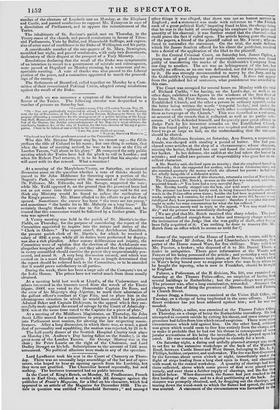Lord Lyndhurst took his scat in the Court of Chancery
on Thurs- day. There was an unusually large assemblage of the bar and of spec- tators, who hoped to hear an opening speech from his Lordship, but they were not gratified. The Chancellor bowed repeatedly, but said nothing. The business transacted had no public interest.
In the Court of King's Bench, on Monday, M. Prudhomme, French cook to Earl Grey, obtained a verdict with 50/. damages against the publisher of Fraser's Magazine, for a libel on his character, which had appeared in an article of the Magazine for December 1833. The ar- ticle in question was entitled "Household Servants ; " and amongst other things it was alleged, that there was not an honest servant in England ; and & statement was made with reference to " the French cook of a great political Earl," imputing fraud to him, the charge being that he was in the habit of overcharging his employer in the price and quantity of his charcoal: it was further stated that the charcoal-seller could prove the fact if called upon. The article having gone the round of the papers, a friend of the plaintiff called on Mr. Fraser ; who re- fused to contradict the statement. On the trial, the main defence which Sir James Scarlett offered for his client the publisher, resolved into a denial of the application of the libel to the plaintiff.
In the Central Criminal Court, on Saturday last, James Ogden, a young man of good character and respectable connexions, was found guilty of transferring the marks of the Goldsmith's Company from one ring to another. The act was an infringement of the law, but morally no offence, as no one was defrauded, nor did the prisoner gain - by it. He was strongly recommended to mercy by the Jury, and by the Goldsmith's Company who prosecuted him. It does not appear from the published list of sentences, what punishment was awarded in • this case.
The Court was occupied for several hours on Monday with the trial of Richard Carlile, "for having, on the Lord's-day, as well as on other days, exhibited two figures in the windows of the first floor of the house No. 62, Fleet Street, the one representing a bishop of the Established Church, and the other u person in ordinary apparel, under the latter being written the words temporal broker,' and under the former the words ' spiritual broker,' with other inscriptions, describing them as two props of the Church." This was described as a nuisance, on account of the crowds that it collected, as well as its public nide- corum. Carlile defended himself, and frequently gave great offence to Judge Park by his irreverent remarks on the Established Church. He was found guilty; but judgment was respited and the prisoner suf- fered to go at large on bail, on the understanding that the nuisance should be abated.
At the Middlesex Sessions, on Saturday, Ann Brown, a respectable female, was charged with stealing a pound of butter. She bad par. chased some articles at the shop of a cheesemonger, whose shopman, missing the butter, followed her out and found the missing article in her basket. In her defence, she said th at she had taken the butter by mistake ; and called two persons of respectability who gave her an ex- cellent character.
A Mr. Bentley said, she lived upon an annuity ; that she employed herself in needlework ; that she supported her mother, who lives in Gloucestershire, and also remitted quarterly the money which she allowed her parent : he beli:1.111 her wholly incapable of a dishonest action. The Jury, in consequence of this character, returned a verdict of Not Guilty. The Chairman (Mr. ltotch), as soon as tine verdict was returned, said hthe acquitted female—" You have had a very merciful Jury." Mr. Bentley hastily stepped into the box, and with much animation said- " The prisoner has been very hardly used, in being harassed backwards and for- wards to the Police-office seven times; besides she had been imprisoned 'el/0.a' weeks, unjustly as I conceive, for what I must say she never did, becau,e a eery intelligent Jury have pronounced her innocent : therefore I consider this court ought to make her some remuneration for what she has suffered." The Chairman merely said in reply to the appeal, "You may stand down, Sir ;" and the prisoner was immediately discharged.
[We are glad thatMr. Rotch received this sharp rebuke. The poor woman had suffered enough from a false and trumpery charge witheat the insinuation of the Judge that she was guilty of theft, after havi:Ig been fully acquitted of it. Can nothing be done to remove this Mr. Rotch from an office which he seems so unfit for?]




















 Previous page
Previous page